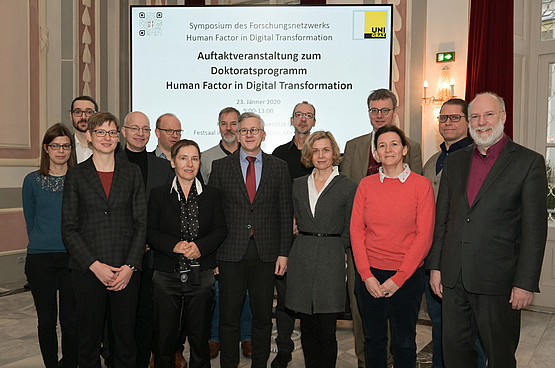Persones

Participating Institutions
With the Institute for Information Science and Information Systems (SOWI), the Centre for Information Modelling/Digital Humanities (GEWI) and the Department of Law and IT (Basic Institute REWI), three units institutionalised at different faculties of the University of Graz with an explicit professional focus on digitisation join forces to form the core of the research network. This institutional core is supplemented by other people from SOWI, GEWI, THEO and URBI, who have already been demonstrably intensively dedicated to questions of digitisation for years within the framework of the "Platform for Information Science". The core of the research network also includes those involved in the H2020 project TRUESSEC.eu from GEWI, SOWI and REWI.
The research network is open to all persons working in their respective disciplines at the University of Graz on the challenges of the digital transformation and who want to actively shape it.
| (associate) members (institute) | Research focus |
| Univ.-Prof. Dr. Manfred Füllsack (Institute of Systems Sciences, Innovation and Sustainability Research) | Game and network theory, cybernetics, simulation of complex systems, multi-agent simulation, artificial intelligence, sociology and economics of work |
| Ao.Univ.-Prof. Dr. Christian Hiebaum (Institute for the Foundation of Law) | Egalitarianism, common good, global justice, individual and collective autonomy, market liberalism and (post-)technocracy |
| Univ.-Prof. Dr. Jörn Kleinert (Institute for Economics) | International trade, European integration, activities of multinational enterprises, globalisation |
| Univ.-Prof. Dr. Bettina Kubicek (Institute for Psychology) | Work psychology, flexibilisation and intensification of work |
| Univ.-Prof. Dr. Kathrin Otrel-Cass (Institute of Education Research and Teacher Education) | Interface between people and technology (especially in the school sector) |
| Ao.Univ.-Prof. Dr. Christian Schlögl (Institute for Operations and Information Systems) | Information and knowledge management, infometrics and scientometrics, information literacy |
| Univ.-Prof. Dr. Elisabeth Staudegger (Institute for the Foundation of Law) | IT law and legal informatics, esp. data economy, copyright and liability for AI |
| Univ.-Prof. Dr. Georg Vogeler (Austrian Centre for Digital Humanities) | digital edition, digital diplomatics, semantic web technologies, late medieval administrative records, deeds of Frederick II. |
| Univ.-Prof. Dr. Stefan Thalmann (Business Analytics and Data Science-Center) | Use of data-based technologies in the economy, and their impact on work and society |
| ao.Univ.-Prof. Dr Christian Wessely (Institut für Systematische Theologie und Liturgiewissenschaft) | Film and Theology, Theology and New Media, Computer Games, Theology of the Diaconate, Comic Culture |
| Univ.-Prof. Dr. Dr. Franz Winter (Institute for Religious Studies) | Religious Studies, Religions and Media, Asian History of Religions |
| Ass.Prof. Dr. Chiara Zuanni (Austrian Centre for Digital Humanities) | Museology, digital heritage, digital curation, social media research, public archaeology, heritage studies, visitor studies |
| Martin Griesbacher, Bakk. MA (Institut für Soziologie, Center for Social Research) | Work and working time, sociology of time, human factor in cybersecurity and cybercrime, digitalisation and trust |
External associate members
| PD Dr. Matthias Kettemann, LL.M. (Harvard) (Leibniz Institute for Media Research | Hans-Bredow-Institut (HBI)) | Internet law and internet governance, (internet) international law, platform regulation, legal issues of digitalisation, human rights in the digital age |
Assoz.-Prof. Dr. Viktoria Pammer-Schindler (Graz University of Technology) | Knowing, learning, working in the digital transformation: technology-enhanced learning and reflection, AI-based technologies for learning and (knowledge) work, socio-technical design of AI-based technologies |
| MMag.Dr. Johanna Muckenhuber (FH Joanneum | University of Applied Sciences Graz) | Consequences of social inequality, lack of social resources and poor working conditions on mental and physical health, with a special focus on gender and age, requirements, resources and room for manoeuvre in connection with digitalisation processes at the workplace |
| Dr. Jelena Rubesra-Zim (TU Graz) | Data integration, Data management, Information management, Arbeitsgruppe .areaE |


